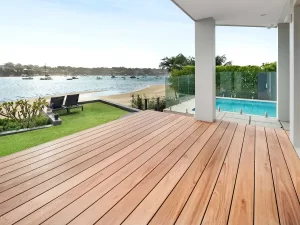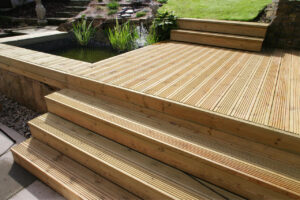Eco-Friendly Decking Options: Sustainable Choices for Your Outdoor Space
Creating an outdoor space that is both beautiful and environmentally friendly is a priority for many homeowners today. With increasing awareness about sustainability, choosing eco-friendly decking options has become an essential part of responsible home improvement. From recycled materials to responsibly sourced wood, there are numerous ways to build a deck that minimizes environmental impact while maintaining durability and style.
The Importance of Sustainable Decking
 Traditional decking materials, such as pressure-treated wood and composite boards with harmful chemicals, can have a negative impact on the environment. They often require deforestation, excessive water use in production, and can release toxins into the soil over time. Eco-friendly decking options address these concerns by utilizing renewable resources, recycled materials, and non-toxic finishes. By choosing sustainable decking, homeowners can contribute to a healthier planet while enjoying a long-lasting and aesthetically pleasing outdoor space.
Traditional decking materials, such as pressure-treated wood and composite boards with harmful chemicals, can have a negative impact on the environment. They often require deforestation, excessive water use in production, and can release toxins into the soil over time. Eco-friendly decking options address these concerns by utilizing renewable resources, recycled materials, and non-toxic finishes. By choosing sustainable decking, homeowners can contribute to a healthier planet while enjoying a long-lasting and aesthetically pleasing outdoor space.
Reclaimed Wood: A Natural and Unique Choice
One of the most sustainable decking options is reclaimed wood. Sourced from old buildings, barns, and factories, reclaimed wood offers a rustic and unique appearance that cannot be replicated with new lumber. Since it is repurposed from previous structures, it reduces the demand for newly harvested trees, helping to preserve forests. In addition to its environmental benefits, reclaimed wood is often stronger and more durable than newly milled timber because of its age and density.
Bamboo Decking: A Rapidly Renewable Resource
Bamboo is gaining popularity as an eco-friendly decking material due to its rapid growth rate and sustainability. Unlike hardwood trees, which can take decades to mature, bamboo reaches full growth in just a few years. This makes it an ideal renewable resource for decking applications. Bamboo is naturally resistant to moisture, pests, and rot, making it a durable option for outdoor use. When treated properly, it provides the same warmth and elegance as traditional wood while being a more sustainable alternative.
Composite Decking: Made from Recycled Materials
Composite decking is another excellent sustainable option that combines the durability of synthetic materials with the environmental benefits of recycling. It is typically made from a blend of recycled wood fibers and plastic, reducing the need for virgin materials. Unlike traditional wood, composite decking requires minimal maintenance, as it does not warp, splinter, or require frequent staining. Many manufacturers are now producing composite boards using post-consumer waste, further contributing to a circular economy.
Thermally Modified Wood: An Innovative Eco-Friendly Solution
For those who prefer the look and feel of natural wood but want enhanced durability, thermally modified wood is a great choice. This type of wood is treated with heat and steam instead of chemicals, making it a more environmentally friendly alternative to pressure-treated wood. The heat treatment process alters the wood’s cellular structure, improving its resistance to moisture, decay, and insects. This increases its lifespan while reducing the need for chemical preservatives, making it a sustainable and non-toxic decking option.
Responsibly Sourced Hardwood: Ensuring Ethical Forestry Practices
Hardwood decking, when sourced responsibly, can be an eco-friendly choice. Many organizations, such as the Forest Stewardship Council (FSC), certify wood products that come from sustainably managed forests. Choosing FSC-certified hardwood ensures that logging practices promote reforestation, protect biodiversity, and support local communities. Tropical hardwoods like ipe and teak are known for their strength and longevity, but it is crucial to ensure they are harvested under ethical forestry guidelines to avoid contributing to deforestation.
Plastic Lumber: A Fully Recycled Alternative
Plastic lumber is an innovative decking material made entirely from recycled plastics, such as milk jugs and detergent bottles. By repurposing plastic waste, this option helps reduce landfill waste while providing a durable and low-maintenance decking solution. Unlike wood, plastic lumber is resistant to moisture, mold, and insect damage, making it an excellent choice for climates with extreme weather conditions. Although it does not mimic the exact texture of wood, it comes in a variety of colors and finishes that offer a modern aesthetic.
Choosing Non-Toxic Finishes and Sealants
 In addition to selecting sustainable decking materials, using non-toxic finishes and sealants is essential for maintaining an eco-friendly outdoor space. Many traditional stains and sealers contain volatile organic compounds (VOCs) that can be harmful to both the environment and human health. Opting for water-based, low-VOC, or plant-based finishes ensures a safer and more sustainable decking solution. These products help protect the deck from moisture and UV damage without releasing harmful chemicals into the air or soil.
In addition to selecting sustainable decking materials, using non-toxic finishes and sealants is essential for maintaining an eco-friendly outdoor space. Many traditional stains and sealers contain volatile organic compounds (VOCs) that can be harmful to both the environment and human health. Opting for water-based, low-VOC, or plant-based finishes ensures a safer and more sustainable decking solution. These products help protect the deck from moisture and UV damage without releasing harmful chemicals into the air or soil.
The Future of Sustainable Decking
As the demand for eco-friendly building materials continues to grow, advancements in sustainable decking options are constantly evolving. Innovations in biocomposite materials, recycled-content decking, and improved production processes are making it easier than ever to create an outdoor space that is both functional and environmentally responsible. With more consumers prioritizing sustainability, manufacturers are investing in greener solutions that offer the perfect balance between aesthetics, durability, and eco-consciousness.